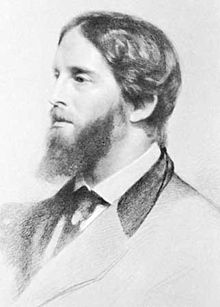Francis Turner Palgrave
Francis Turner Palgrave (born September 28, 1824 in Great Yarmouth , Norfolk , England , † October 24, 1897 in London ) was a British literary critic , poet and long-time Oxford Professor of Poetry .
Life
The oldest son of the historian Sir Francis Palgrave spent his childhood in Great Yarmouth as well as in his father's house in Hampstead and from 1838 attended the elite private Charterhouse School . After he made numerous trips to Italy and other European countries in the following years , he began studying at Balliol College at the University of Oxford in 1843 , where he received a scholarship to Balliol College. In 1846 he temporarily interrupted his studies and worked as assistant to the private secretary of William Ewart Gladstone , before he resumed his studies in the subject Literae Humaniores in 1847 .
Between 1847 and 1862 he was a fellow at Exeter College and was also in 1849 employees of the Department of Education in Whitehall . In 1850 he accepted the appointment as vice-principal of Kneller Hall Training College in Twickenham , where he came into contact with the poet Alfred Tennyson, 1st Baron Tennyson , with whom he became a lifelong friend. After the college was closed in 1855, he returned to Whitehall to the Department of Education, first examiner and then assistant secretary ( Assistant Secretary ).
In 1884 he resigned from his position in the Ministry of Education and in 1885 followed John Campbell Shairp as holder of the prestigious Chair of Poetry at the University of Oxford. He taught as Oxford Professor of Poetry until 1895 and was then replaced by William Courthope .
His younger brothers were the famous Orient travelers Gifford Palgrave , the economist Sir Inglis Palgrave and longtime Clerk of the House ( House of Commons ) , Sir Reginald Palgrave.
Publications
Palgrave wrote not only literary criticism and poetry, whereby his literary critical treatise were far more significant. One of his first volumes of poetry was Idylls and Songs (1854). His Visions of England (1880 to 1881) have dignity and clarity, but far less the "natural magic" that inspired the lyric works of many of his predecessors. In 1892 his last volume of poetry appeared, Amenophis .
On the other hand, his critical works were always characterized by a fine and sensitive rhythm, quick intuitive perception and, as a rule, a sense of proportion as in The Passionate Pilgrim (1858).
His early main work, Golden Treasury of English Songs and Lyrics (1861), became his most important contribution to the development of literary taste. In doing so, he created an anthology of the best poems in the English language, which was solid and spacious and structured with a sensitivity that could hardly be surpassed. The book also included works by lesser-known poets such as George Darley's "It is not beauty I desire".
His Handbook the Fine Arts Collection, International Exhibition (1862) and the Essays on Art (1866) were not free from dogmatism and over-empathy, but on the other hand they were sincere contributions to art criticism, full of striking and strikingly expressed judgments. During this time he also edited the memoirs of Arthur Hugh Clough (1862) and a critical essay on the poems of Walter Scott in 1866 . In 1877 a collection of poems by Robert Herrick , as well as Sonnets and Songs of Shakespeare , was published under the title Chrysomela .
After a collection of poems by John Keats (1885), Treasury of Sacred Song was published in 1889 , before a second volume, Golden Treasury (1897), which presented the work of later poets, but which did not come close to the literary-critical subtleties of the first volume.
His last published book Landscape of Poetry (1897) showed broad knowledge and critical appreciation and thus became an excellent poetic interpretation of the time.
Fonts
- Robert H. Palgrave (Ed.): Collected historiacal Works of Sir Francis Palgrave . University Press, Cambridge 1919/22 (10 vol.).
Web links and sources
- Literature by and about Francis Turner Palgrave in the catalog of the German National Library
- Francis Turner Palgrave in the nndb (English)
- Chambers Biographical Dictionary, Edinburgh 2002, ISBN 0-550-10051-2 , p. 1161
- Meyers Großes Personenlexikon , Mannheim 1968, p. 993
| personal data | |
|---|---|
| SURNAME | Palgrave, Francis Turner |
| BRIEF DESCRIPTION | British poet and literary critic |
| DATE OF BIRTH | September 28, 1824 |
| PLACE OF BIRTH | Great Yarmouth , Norfolk , England |
| DATE OF DEATH | October 24, 1897 |
| Place of death | London |

